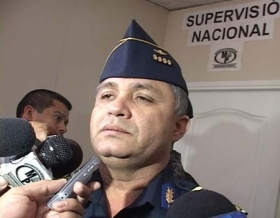Honduras’ government replaced the country’s police chief after it emerged an imprisoned ex-officer could be linked to the recent murder of a journalist. However, the move will likely do little to combat the rampant corruption within the police force.
President Porfirio Lobo removed the National Police chief, General Ricardo Ramirez del Cid (pictured), on May 21, placing Juan Carlos Bonilla in charge with immediate effect, reported the AFP.
Ramirez became the second police chief to fall in seven months, having replaced Jose Luis Muñoz Licona just last October. Muñoz was fired following accusations that policemen murdered two university students.
Like Muñoz, Ramirez had become engulfed in a high-profile police scandal, this time surrounding the kidnapping and murder of journalist Alfredo Villatoro. The radio journalist was taken hostage on May 9 and found dead a week later, with an ex-police officer arrested before the discovery of the body on suspicion of involvement in Villatoro’s disappearance. He was later released without charge.
One of the five people currently being held for the murder is also a former police agent, Miguel Angel Alvarez, who has been in prison since last April for complicity in homicide. The tipping point for Ramirez’s removal, however, appeared to come when Security Minister Pompeyo Bonilla announced Monday that Alvarez was found to be still receiving his police salary while incarcerated. Bonilla added that the government had discovered evidence of 55 other officers who, despite being charged with crimes, also still drew their salaries.
The head of Human Resources for the police, Luis Aguilar Mazzoni, was also fired for allegedly authorizing Alvarez’s salary.
InSight Crime Analysis
This latest scandal to envelope the authorities is only the tip of the iceberg when looking at police corruption in Honduras — a country where some 40 percent of officers are suspected of organized crime ties — and the removal of Ramirez will therefore do little to combat the endemic nature of the problem. This is all the more true if Ramirez had little knowledge of, or indeed involvement in, this particular case of corrupt practice.
While the impetus for change has been less than forthcoming within the police force itself, the Lobo administration arguably shoulders some of the blame. Despite the creation of a commission this year to help purge the force of corrupt elements, little has been achieved thanks to a lack of police cooperation and an apparent dearth of political will to effectively push the initiative forward.
Allegations of police involvement in the Villatoro killing are a sharp contrast to the government’s initial characterization of the murder. On May 16, immediately after Villatoro’s body was discovered, Minister Bonilla attributed the murder to drug gangs “trying to frighten Honduran society.”

